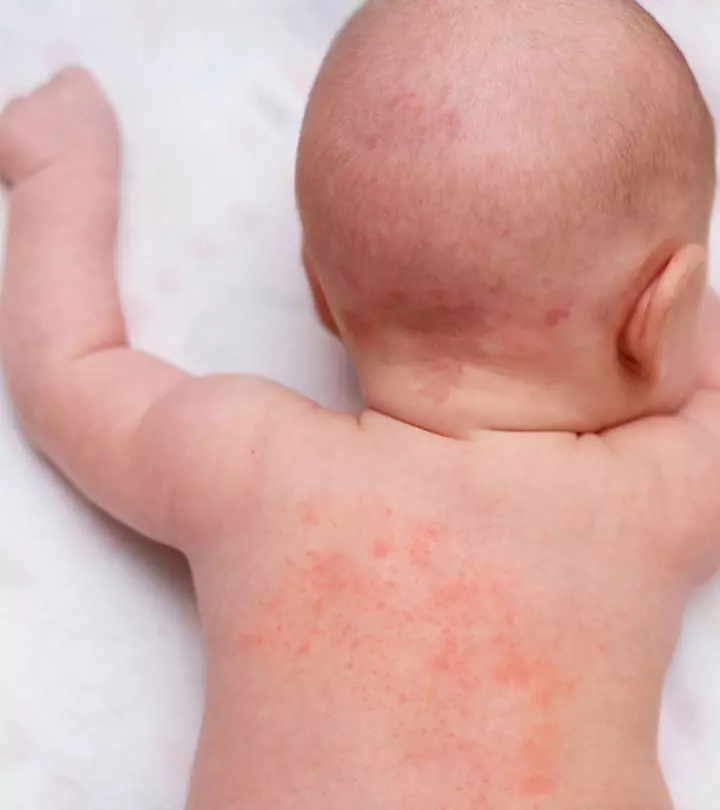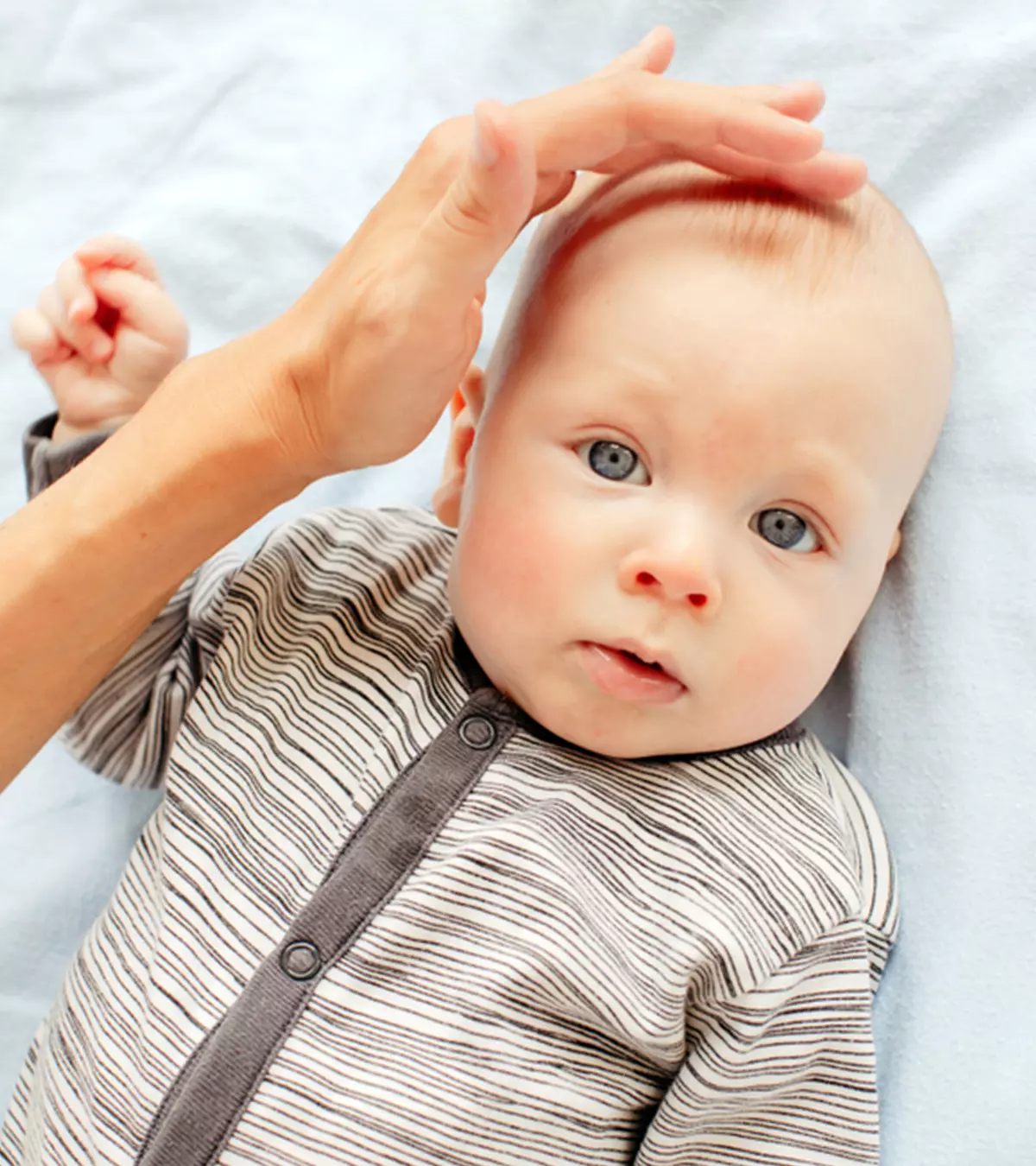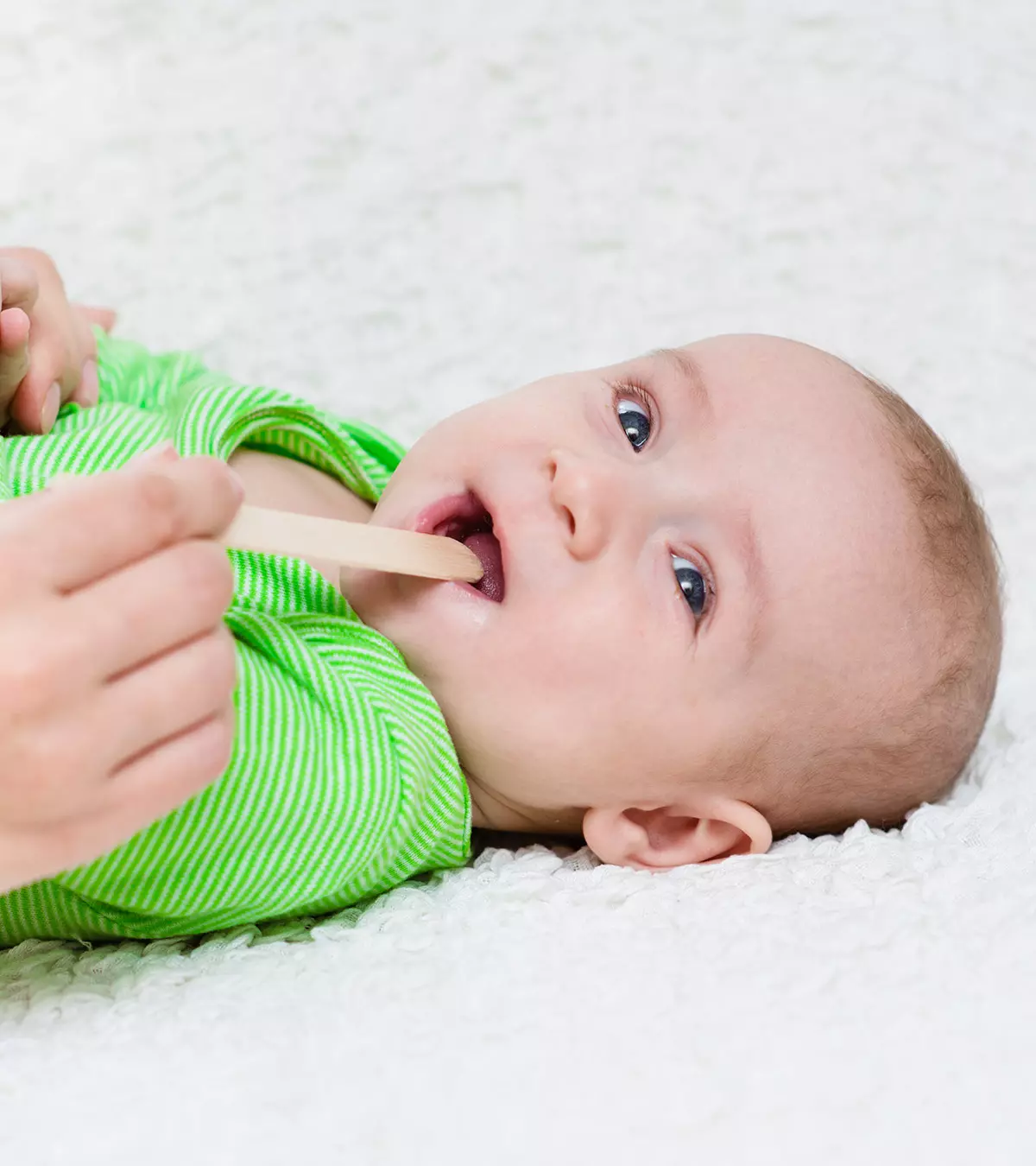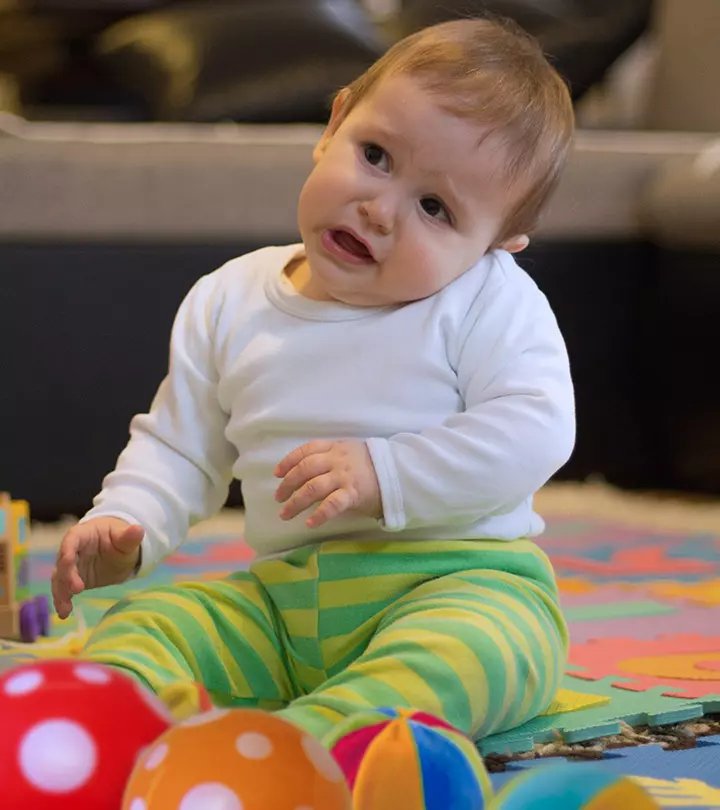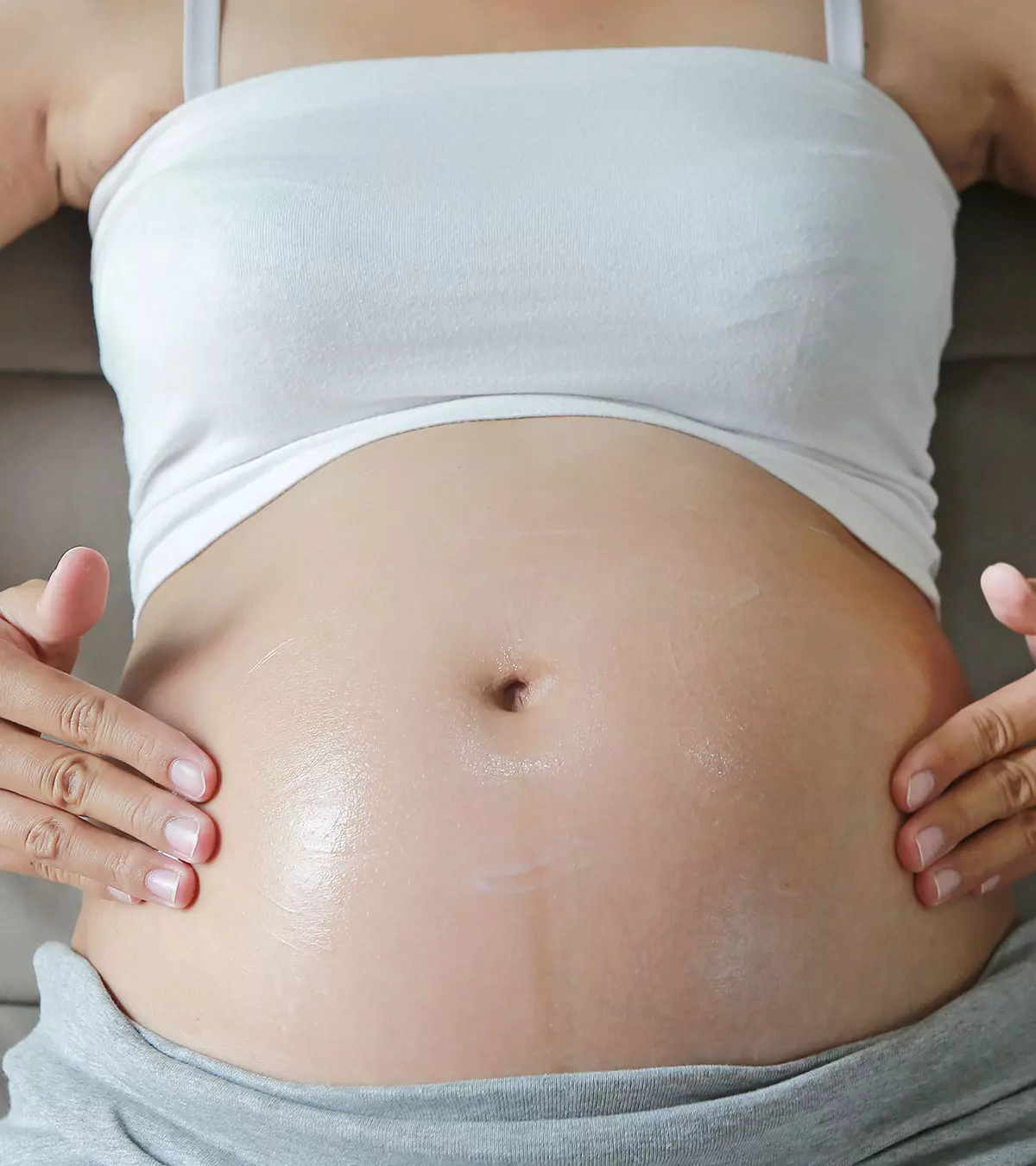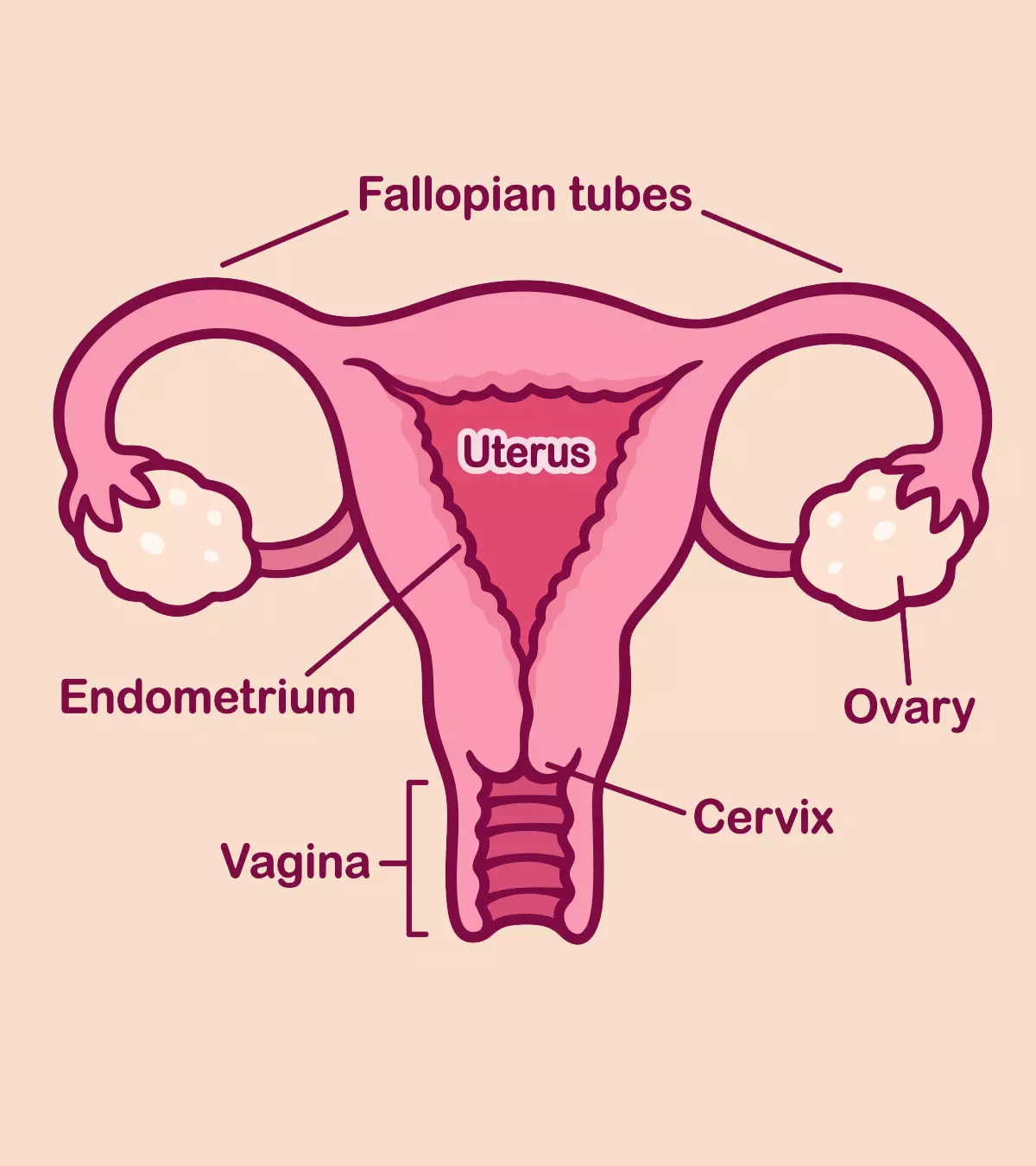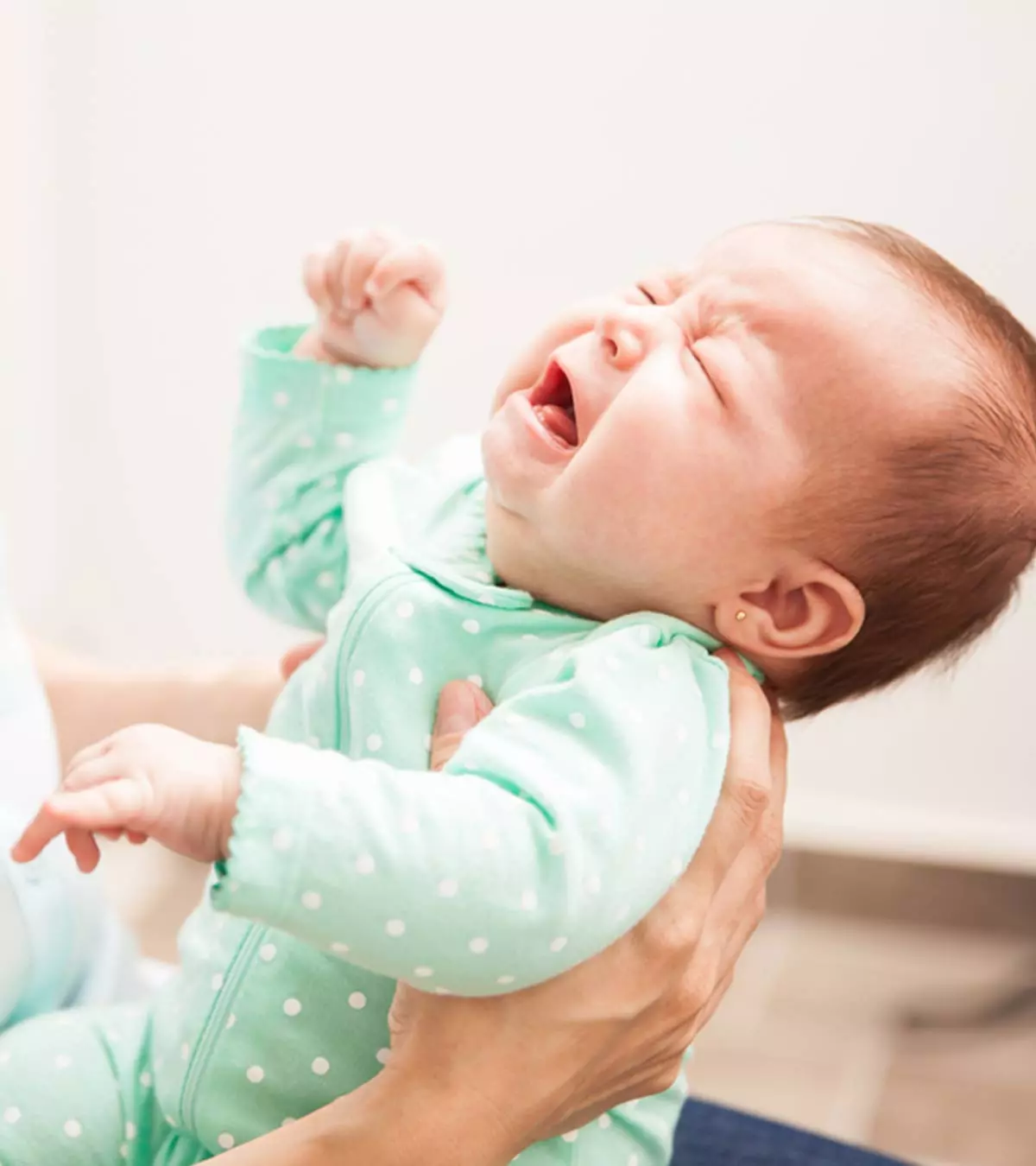
Image: Shutterstock

Parents and caregivers may have concerns about why their baby cries when pooping. Everything is new to a baby, and they are in the process of adjusting and understanding the bodily functions and surroundings. Some babies may cry while passing bowel movements since this sensation can be strange for them. However, a few babies may cry due to tummy troubles or pain. It is recommended to seek pediatric care if your baby often cries while pooping and has other digestive symptoms.
Read on to know why a baby cries when pooping and what you can do about it.
Key Pointers
- Babies can cry while pooping for various reasons, including getting used to new sensations, constipation, colic, and anal fissure.
- Occasional crying while pooping may not be cause for concern. However, excessive and frequent crying and coexisting symptoms should be evaluated by a pediatrician.
- Adequate hydration and feeding, a fiber-rich diet for babies on solids, warm compress, and probiotics may help relieve many causes of crying.
Why Do Babies Cry While Pooping?
The reasons for your baby crying while pooping may range from your baby getting used to the sensation of pooping to an underlying medical condition. Let us look at each in detail.
1. Getting used to the sensation of pooping
If your baby cries during pooping in the initial days, it could be because they are still adapting to the sensation of pooping. It could also be because the baby’s abdominal muscles are still underdeveloped, making it difficult to pass stools (1). Dr. Cindy Rubin, MD, IBCLC, a board-certified pediatrician and breastfeeding specialist from Westchester, Illinois, says, “They may cry when they’re pushing it out, or even for a while before that. This happens because they are learning! These are new sensations for babies; it takes a while to understand what is going on and connect with what they need to do.
“Also, it is difficult to poop while you’re lying down with brand-new weak abdominal muscles. However, this is a part of the newborn experience and nothing to worry about.”
This is quite normal, and you need not worry if your baby makes faces or grunts while pooping as they will get used to it with time.
2. Constipation

Image: Shutterstock
Infants might also suffer from constipation, which can make them cry while pooping. If the bowel movements are hard and irregular, your baby could be constipated. The common signs of constipation in babies include (1):
- Fussiness
- Spitting up
- Hard and dry stools
- Discomfort during bowel movements
- Tummy pain and bloating
- Having less than three bowel movements in a week (this is more common in children)
Emily Marie, a mom, shares in her Vlog how her one-month-old baby had altered bowel movement. She says, “I noticed that Alyssa was struggling to poop, and I immediately assumed that she was constipated. I then took her to the doctor, who concluded that my baby was not constipated. He advised me to mix half an ounce of prune juice and half an ounce of water and give it to the baby, only if her stools are hard (ⅰ).’’ She offered prune juice to her daughter two days in a row, and it worked for her.
 Did you know?
Did you know?3. Infant dyschezia
This is a condition in which the infant strains and cries for more than ten minutes before defecating. The baby’s face may turn red or purple until the passage of soft or liquid stool. This is a normal and common gastrointestinal condition and might resolve after a few weeks (2).
4. Anal fissure

Image: IStock
If your baby has chronic constipation, they might develop anal fissure. This could be related to severe straining during stooling. The condition is defined as a small tear of the skin in the lining of the anus or anal canal, resulting from passing hard stools. The American Society of Colon and Rectal Surgeons (ASCRS) suggest that about 85-90% of anal fissures occur in the posterior midline or back of the anus, and 10-15% of them occur in the anterior midline or front of the anus. A recent study suggests that colic in babies is closely associated with anal fissures and painful defecation (3).
5. Colic
Colic affects approximately 10–40% of infants. It peaks at around six weeks of age, and the symptoms start to resolve by three to six months. Babies tend to uncontrollably cry while suffering from colic. Other symptoms include bloody stools, excessive gas and pain during pooping, skin rashes, and vomitings. So, if your baby cries while pooping, try to determine if it is infantile colic (4).
 Research finds
Research findsWhen Should You Worry?

Image: Shutterstock
Mild grunting and occasional crying while pooping are common in infants. However, if your baby cries excessively during defecation, and you notice fever, feeding difficulties, and blood in their stools, it is best to take them to your pediatrician. Dr. Rubin observes, “Older babies still may do a lot of grunting and turning red, but as long as their poops are soft and they are pooping every one or two days, it’s normal. However, if the poop is hard or like rabbit pellets, it is a sign of constipation and should be addressed with your pediatrician.”
Tips To Stop Babies From Crying While Pooping
Breastfeeding babies may poop several times a day to once a week, and formula-fed infants may poop several times a day to once in four days (5). So, do not worry if your child occasionally cries while pooping. However, you can always use some handy tips to help them manage pain and stop them from crying.
- If you are breastfeeding, try and change your diet and see if your baby passes soft stools subsequently. In the case of formula feeding, consult a lactation expert or your pediatrician.
- Include high fiber foods, such as broccoli, pears, prunes, and bananas in the diet of babies who have started on solids.
- Keep your baby hydrated by feeding them milk from time to time. For babies older than six months, you can offer them water or pear juice.
- Gently massage your baby’s belly button and stomach area. You can also bicycle their legs to help them release excess gas.

Image: IStock
- Put a warm compress on their belly to help them pass stools more comfortably and relieve the baby’s discomfort. Also, make sure you burp your baby after every feed. To avoid any discomfort, be sure to do frequent diaper changes.
- Probiotics may help relieve colic symptoms in babies. Talk to your pediatrician and administer them accordingly.
If your baby still cries when pooping or you observe any other symptoms, such as abdominal pain, change in stool color, or constipation, seek medical advice immediately.
 Quick tip
Quick tipFrequently Asked Questions
1. Why do babies cry when pooping after starting solids?
Sometimes, when babies start eating solid food, they find it difficult to digest, which may lead to constipation or diarrhea. These conditions make pooping difficult for babies, causing them to cry (6).
2. Do breastfed babies struggle to poop?
Babies, whether breastfed or bottle-fed, may have to strain slightly for their bowel movements because they lie flat, preventing gravity from easing the process (7).
3. Can a mother’s diet cause constipation in a breastfed baby?
Constipation is rare in breastfed babies. However, it is normal for babies to go without pooping for four or five days. This condition may not occur because of constipation or your diet but because breast milk is easily digested and produces little waste. However, if you believe your baby is constipated and has hard poop, consult a doctor to check whether your diet is affecting the baby’s digestion (8) (9).
4. Does gripe water help babies poop?
It is a popular belief that gripe water relieves baby’s tummy troubles such as colic or constipation; however, it is not recommended to give it to babies as it may have adverse effects (10). The WHO recommends that babies be exclusively breastfed in the first six months and not given any other drink or food unless suggested by a healthcare professional.
It should not be a cause for concern if your baby is crying while pooping if they are otherwise happy and healthy. Babies may take time to adjust to the pooping sensation as their muscles develop. Hard and dry stools are difficult to pass and may cause anal fissures. Additionally, colic in infants may add to stomach or abdominal discomforts. Prevent baby constipation by modifying their diet and water intake or increasing breastfeeding frequency if the baby is below six months. Talk to a pediatrician if the problem worsens or your baby cries uncontrollably during defecation.
Infographic: Some More Reasons And Tips To Know
It is not uncommon to notice an infant groaning while passing stools; however, there could be an underlying cause for pain that needs to be assessed. Explore this infographic to know why infants may cry when passing stools and what to do to help them come out of it.
Some thing wrong with infographic shortcode. please verify shortcode syntax
Some thing wrong with illustration image shortcode. please verify shortcode syntax
Personal Experience: Source
MomJunction articles include first-hand experiences to provide you with better insights through real-life narratives. Here are the sources of personal accounts referenced in this article.
ⅰ. Why does my one month old struggle to poop?https://www.youtube.com/watch?v=Auq5kLaGxok
References
1. Constipation in infants and children; MedlinePlus
2. Paul E. Hyman et al.; Childhood Functional Gastrointestinal Disorders: Neonate/Toddler; American Gastroenterological Association (2005).
3. Khajik Sirob Yaqob; Colic and Anal Fissure in Infancy: The Missing Significant Correlation; EC Paediatrics (2017).
4. Jeremy D Johnson, Katherine Cocker, and Elisabeth Chang; Infantile Colic: Recognition and Treatment; American Family Physician (2015).
5. Helping Your Newborn Get Through Painful Pooping; University Of Utah
6. Constipation; La leche league international
7. How Can I Tell if My Baby Is Constipated? Nemours Children’s Health
8. How Long Can A Baby Go Without Pooping? Children’s MD
9. Breastfeeding FAQs: Your Eating and Drinking Habits; Nemours Kids Health
10. B. Adhisivam; Is gripe water baby-friendly? NCBI (2012)
11.Infants straining to move bowelsIs gripe water baby-friendly; Children’s Wisconsin
Community Experiences
Join the conversation and become a part of our nurturing community! Share your stories, experiences, and insights to connect with fellow parents.
Read full bio of Dr. Tashawna Stokes

Dr. Cindy Rubin is a pediatrician and breastfeeding medicine specialist practicing in the Western Suburbs of Chicago. She did her undergrad at Stanford University, medical school at Georgetown, and pediatrics residency at the University of Chicago. After working at Loyola University Medical Center as an outpatient general pediatrician for 13 years, she opened her new practice, In Touch Pediatrics and Lactation.
Dr. Cindy Rubin is a pediatrician and breastfeeding medicine specialist practicing in the Western Suburbs of Chicago. She did her undergrad at Stanford University, medical school at Georgetown, and pediatrics residency at the University of Chicago. After working at Loyola University Medical Center as an outpatient general pediatrician for 13 years, she opened her new practice, In Touch Pediatrics and Lactation.
Read full bio of Rohit Garoo
Read full bio of Dr. Ritika Shah
Read full bio of Ghazia Shah









